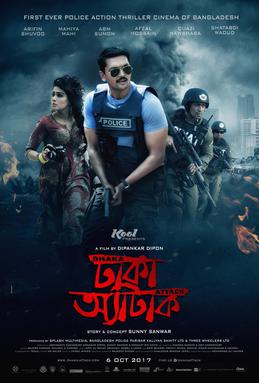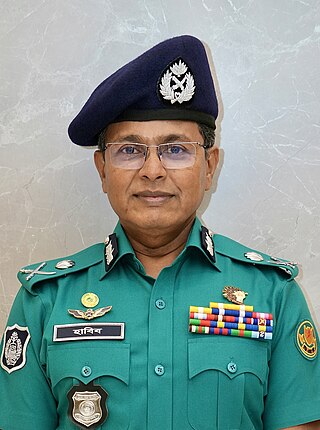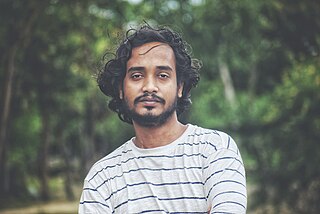
The Bangla Academy is the official regulatory body of the Bengali language in Bangladesh. It is an autonomous institution funded by the Government of Bangladesh that fosters the Bengali language, literature and culture, works to develop and implement national language policy and conducts original research in Bengali. Established in 1955, it is located in the Burdwan House in Shahbagh, Dhaka, within the grounds of the University of Dhaka and Suhrawardy Udyan. The Bangla Academy hosts the annual Ekushey Book Fair.

BAF Shaheen College Dhaka also known as BAFSD or Dhaka Shaheen is a co-educational Bangladeshi college established and controlled by the Bangladesh Air Force and primarily for the children of Air Force personnel, but students from the civilian section can also study at the college.
Dhaka International Film Festival is a biennial film festival held in Dhaka, Bangladesh. Established in 1992, the festival was initially organized on annual basis, but became a biennial event since 1995.

The Dhaka Tribune is a major Bangladeshi English-language daily newspaper based in Dhaka, the country's capital and largest city. It also operates an online portal known as the Bangla Tribune. The newspaper has a strong readership in Bangladeshi cities, particularly among the young generation, the diplomatic community, and expatriates; as well as a wide readership in South Asia and internationally. The newspaper is notable for its highly diverse op-ed content, with contributions from leading Bangladeshi, South Asian and international columnists.
The Dhaka School of Economics (DScE) is an undergraduate and postgraduate institution of the University of Dhaka. DScE was founded in April 2010, following the model of the London School of Economics, to promote higher studies and research in economics and related subjects. Its goal is to accommodate the fast-growing demand for well-trained economists and professionals in related subjects, to contribute to teaching, research and evaluation, policymaking and implementation of nation-building programs. DscE has developed a Socio-Economic Data Bank to accomplish this goal.

.

Kazi Anis Ahmed is a Bangladeshi writer, publisher and businessman. He is a co-founder and publisher of the English-language daily newspaper Dhaka Tribune, online news portal Bangla Tribune and the literary journal Bengal Lights. Ahmed is the author of three works of fiction. He is a co-director of the annual Bangladeshi literary festival, Dhaka Lit Fest.

Amitabh Reza Chowdhury is a Bangladeshi filmmaker. In his career, he has directed nearly fifteen hundred (1500) television commercials. Amitabh has also directed a few television films to critical acclaim. He founded the production house 'half stop down', which mainly produces TVCs. Amitabh's directorial debut in theatrical feature film is Aynabaji which was released on 30 September 2016.

Dhaka Attack is a Bangladeshi police action thriller film produced by Bangladesh Police Paribar Kallyan Samity Ltd., Three Wheelers Ltd. and Splash Multimedia. It features Arifin Shuvoo, Mahiya Mahi, ABM Sumon and Taskeen Rahman in lead roles. It was directed by Dipankar Dipon and written by Sunny Sanwar. The film was distributed by The Abhi Kathachitra and Swapna Scarecrow. The film won the "Best Film" award in 42nd Bangladesh National Film Awards.

Syed Akram Hossain is a Bangladeshi academic scholar. He is known for his research and analysis of Rabindranath Tagore's work, which makes him an important part of Bangladesh literature. He was awarded Rabindra Purushkar in 2016 by the Bangla Academy and Ekushey Padak in 2017 by the Government of Bangladesh in the research category.

Habibur Rahman is a Bangladeshi police officer. He is the 35th Commissioner of DMP. Prior to join here he was head of the Tourist Police. From 2019 to 2022, he was Deputy Inspector General (DIG) of Dhaka Range, and DIG of administration & discipline at the police headquarters in Dhaka.

Dhaka City Football Club is a football team from Dhaka, Bangladesh. The club currently a team of the Bangladesh Championship League.

Sincerely Yours, Dhaka is a 2018 Impress Telefilm drama film produced as Bangladesh's first anthology film directed by eleven individual directors. It is a collection of gritty shorts centered on the capital city of Bangladesh, Dhaka, and the people living in its margins. It was awarded "Best Original Screenplay" at the 11th edition of the Jaipur International Film Festival (JIFF), held in India in January 2019. It is one of the first two films to enter Netflix originating from Bangladesh. It was selected as the Bangladeshi entry for Best International Feature Film at the 93rd Academy Awards, but it was not nominated. It was also screened at 51st International Film Festival of India in January 2021 in Country in focus section.
Ripon Nath is a Bangladeshi audio engineer. He won Bangladesh National Film Award for Best Sound Recording four times for the films Chorabali (2012), Aynabaji (2016), Dhaka Attack (2017) and Fagun Haway (2019).
Gemcon Group is a Bangladeshi diversified conglomerate based in Dhaka.
Firdous Azim is a professor of English at BRAC University, a literary critic, and a women's rights activist. She is the chairperson of the Department of English and Humanities at BRAC University. She is a member of Naripokkho.
Ruhul Amin Bangladeshi Deobandi is an Islamic scholar and educator. He is currently serving as the Khatib of Baitul Mukarram National Mosque of Bangladesh. He is the Muhtamim of Gowhardanga Madrasa.

Dhaka–Jessore line is a 172 km long under construction broad gauge railway. It is being constructed under the Ministry of Railways, Government of Bangladesh. The line will connect the capital of Bangladesh to Jessore via Dhaka District, Narayanganj District, Munshiganj District, Shariatpur District, Madaripur District, Faridpur District, Gopalganj District, Bangladesh, and Narail District. It is a project related to Padma Bridge.

S M kayum is a Bangladeshi filmmaker, screenwriter and poet. His work addresses such themes as deception-hypocrisy, urban youth romance, middle class angst, and frailty of individual. He has been a director and screenwriter since 2017.













